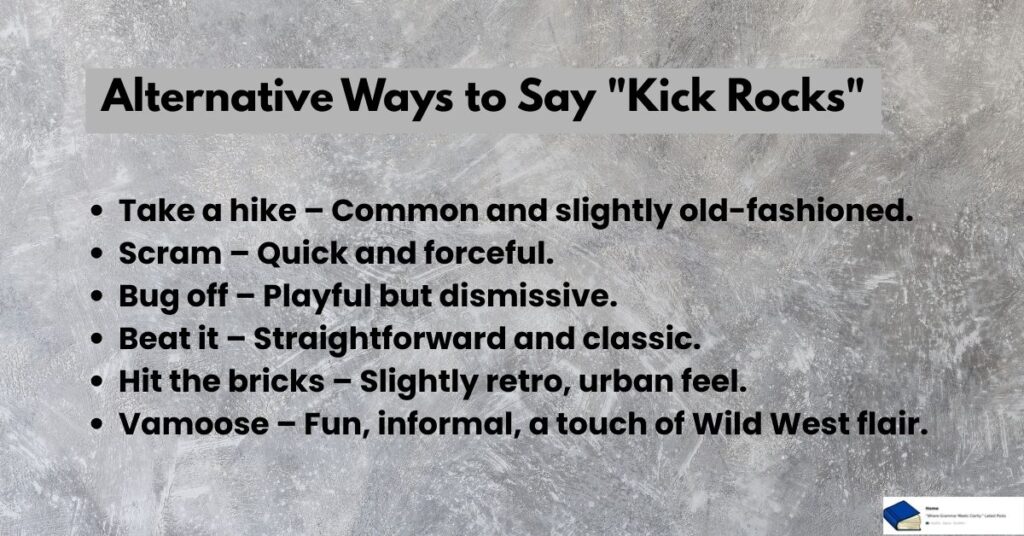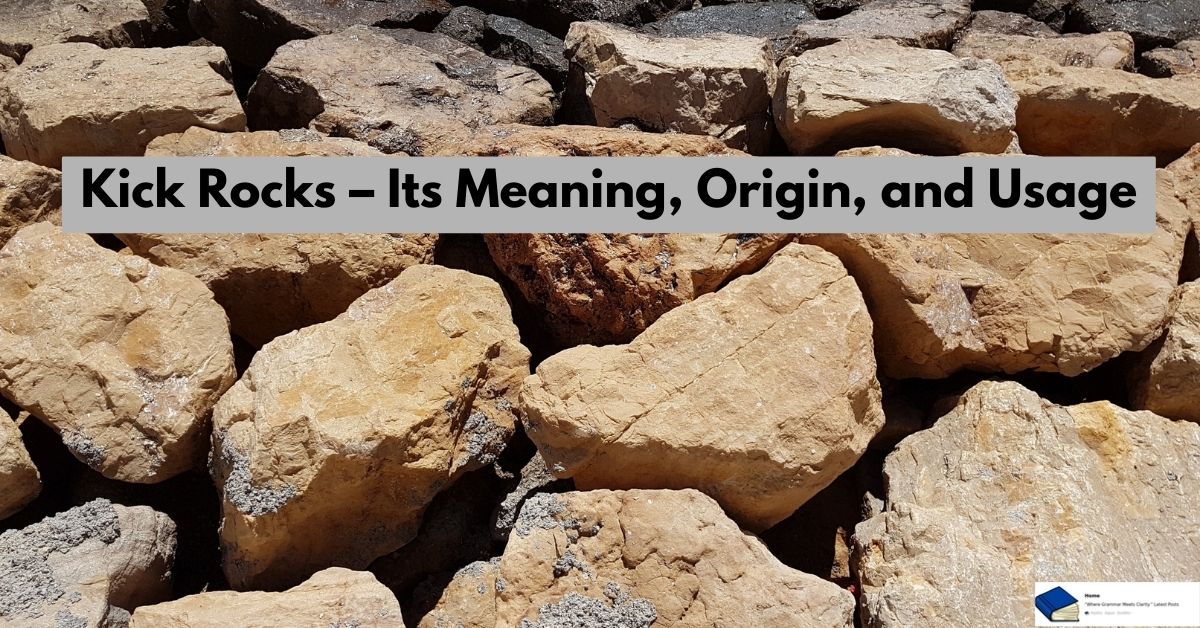Language has a funny way of turning simple images into powerful expressions. One such phrase is “kick rocks” a short, snappy, and often blunt way to tell someone to leave. Whether used in a heated argument, a playful tease, or a casual conversation, this slang has found its way into English-speaking pop culture, music, and everyday banter.
If you’ve ever heard someone say “Go kick rocks!” and wondered what it means, where it comes from, and how to use it without sounding out of place, you’re in the right place. Let’s break down the meaning, origin, and usage of this colorful idiom.
The Meaning of “Kick Rocks”
Simply put, the kick rocks meaning is “go away” or “leave me alone”. It’s a dismissive phrase, often used when someone is annoying, unwelcome, or overstaying their welcome in a conversation.
Depending on the tone, it can range from lighthearted teasing to harsh rejection:
- Friendly teasing: “Hey, if you think you can beat me at basketball, kick rocks!”
- Annoyed tone: “You’re still complaining? Do me a favor and kick rocks.”
This phrase fits in the same category as other slang dismissals like “take a hike”, “scram”, or “beat it”. The intent can be playful or hostile, but it always carries the idea of sending someone away.
Breaking Down the Visual: Why “Kick Rocks”?
The imagery is simple. Picture someone literally kicking small rocks on the ground as they walk away. It’s not glamorous. It’s not purposeful. It’s a bored, aimless action exactly the kind of thing you might do when you’ve been told to leave with nothing better to do.
That mental picture adds a slightly mocking or dismissive edge to the phrase. You’re not just telling someone to go away; you’re suggesting they find something meaningless to do instead.
Common Variations You Might Hear
The core meaning stays the same, but people sometimes spice it up:
- Go kick rocks – more direct and forceful.
- Go kick some rocks – a softer, almost playful variation.
- Kick rocks, buddy – casual but dismissive.
- Why don’t you go kick rocks? – sarcastic and pointed.
These variations all carry the same “leave me alone” tone but can differ in how friendly or aggressive they sound.
Examples in Everyday Conversation
Here are some scenarios showing how the phrase might naturally appear:
Example 1 – Annoyed friend:
Mark: “You really think pineapple belongs on pizza?”
Chris: “If you’re gonna start that argument again, go kick rocks.”
Example 2 – Playful banter:
Emily: “I’m the best at trivia here.”
Jake: “Ha! Kick rocks, you couldn’t even name all the planets.”
Example 3 – Relationship spat:
Sara: “I saw you liking all of her photos.”
Evan: “Oh, kick rocks, you’re making drama for nothing.”
Kick Rocks Meaning Origin
The kick rocks origin is a bit murky, but most linguistic researchers believe it emerged in mid-20th century American slang. It shares a family resemblance to earlier expressions like “take a hike” (1940s) or “hit the road” (1930s), both of which mean to leave immediately.
The phrase likely developed in casual speech in the United States, possibly in urban neighborhoods or military slang, before gaining wider use. The visual imagery someone wandering away, literally kicking rocks out of boredom made it easy to catch on.
Cultural and Pop Culture References
The phrase has appeared in:
- Hip-Hop lyrics – Artists like Ludacris and Snoop Dogg have dropped variations of “kick rocks” in songs.
- TV shows and movies – Especially in comedies and dramas where characters use blunt dismissals.
- Social media memes – People often pair it with reaction GIFs of characters walking away or kids literally kicking stones.
For example, in a 2000s sitcom scene, a character might yell “Go kick rocks!” after being bothered one too many times — cue laughter from the audience.
What Does It Mean to Kick Rocks in Modern Slang?
Today, what does it mean to kick rocks goes beyond literal annoyance. It can also be used:
- As a playful jab among friends.
- In dating situations when rejecting someone.
- In online gaming when telling an opponent to leave the chat.
- On social media to shut down trolls.
It’s become a multi-tone phrase: you can say it in jest, irritation, or even affection — depending on how well you know the person.
The Tone Factor – Playful vs. Aggressive
The tone makes all the difference.
- Playful: “You’re stealing my fries again? Kick rocks!” (Said with a grin.)
- Aggressive: “You’re not welcome here. Kick rocks.” (Said with a firm voice.)
Like other go away slang, it’s all about delivery. You wouldn’t use it with your boss in a professional meeting, but it might be perfect for shutting down your buddy’s bad joke.
Slang Relatives of “Kick Rocks”
To better understand the kick rocks slang family, here’s a quick comparison with similar expressions:
| Expression | Meaning | Tone |
|---|---|---|
| Take a hike | Go away | Neutral |
| Scram | Leave immediately | Harsh |
| Beat it | Get lost | Harsh |
| Hit the road | Leave now | Neutral |
| Shove off | Go away (British) | Slightly rude |
| Bug off | Stop bothering me | Playful |
| Get out of Dodge | Leave quickly | Humorous |
The Psychology Behind Using “Kick Rocks”
Why do people prefer “kick rocks“ over simply saying “leave me alone”?
Two main reasons:
- It’s more colorful. Plain language can sound flat; slang adds personality.
- It softens (or sharpens) the blow. Depending on tone, it can sound less harsh than “Get lost” or more cutting than “Please go.”
People often use idiomatic expressions for leaving because they carry emotional weight they convey frustration, humor, or sarcasm without needing a full explanation.
When You Should Avoid Using “Kick Rocks”
While slang can be fun, there are times when it’s better left unsaid:
- Professional settings – It can come off as disrespectful or unprofessional.
- With strangers – They might take it as a personal insult.
- In delicate situations – If emotions are already high, it could escalate the conflict.
How to Use “Kick Rocks” Without Offending Someone
If you want to use it playfully:
- Say it with a smile – Your facial expression sets the tone.
- Add a playful tag – “Kick rocks, champ!” sounds friendlier.
- Use it in context – Make sure the other person understands you’re joking.
If you intend it seriously, be prepared for a sharp reaction. It’s still a dismissal, after all.
Examples in Pop Culture and Literature
While you won’t find kick rocks in Shakespeare, you will hear it in:
- Rap battles – “You talk big, but you can kick rocks.”
- Sitcom humor – A recurring gag between characters.
- Teen dramas – A blunt breakup line: “Go kick rocks, we’re done.”
Alternative Ways to Say “Kick Rocks”

Why “Kick Rocks” Has Stuck Around
Slang often fades fast, but kick rocks has been around for decades. Why? Because it’s:
- Visual – You can picture it instantly.
- Flexible – Works in humor, irritation, or sarcasm.
- Compact – Two words, big impact.
And in the age of short tweets and snappy texts, short, punchy phrases thrive.
Conclusion
The next time you hear “kick rocks”, you’ll know it’s more than just random words. It’s a colorful, versatile phrase with roots in American slang, used to dismiss someone in a playful or sharp way. Whether you say “Go kick rocks” to a friend in jest or to someone pushing your limits, the phrase carries a punch of attitude with a sprinkle of humor.
Just remember like all slang, context is king. Say it with a grin, and you might get a laugh. Say it with a glare, and you might end a conversation.









